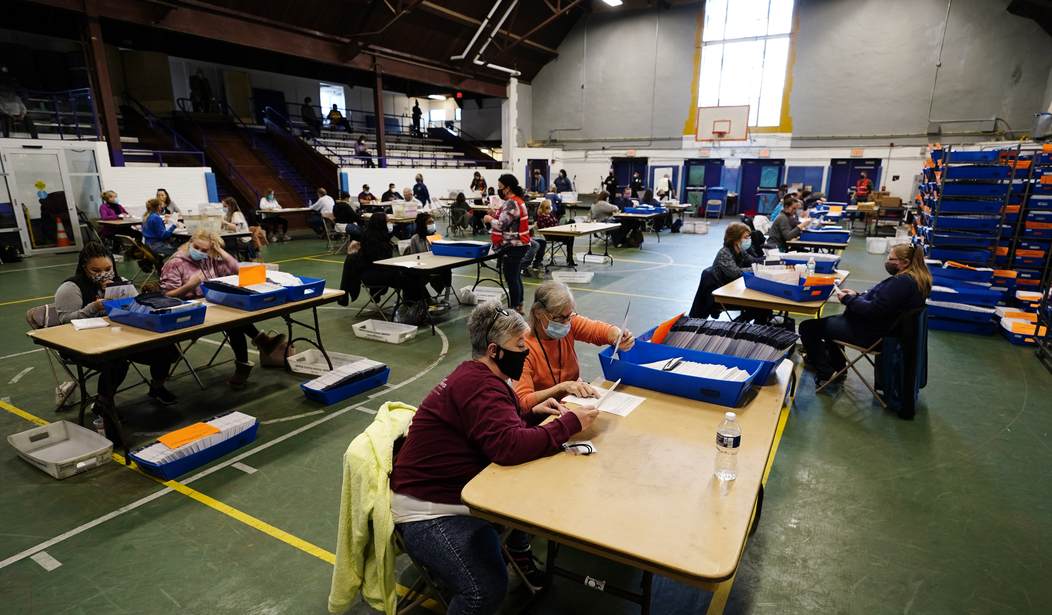I first reported on this case last week after GOP House member Mike Kelly, along with six other individuals, filed suit in Allegheny Court of Common Pleas, alleging that the “no excuse” mail-in voting option passed by the Pennsylvania Legislature as “Act 77”, violates the provisions of the Pennsylvania Constitution, which expressly require that votes be cast in person unless an “absent voter” fits into one of four specific categories which makes the voter eligible to vote by mail. The exceptions are also written into a specific Constitutional provision.
The suit alleges that Act 77 constitutes an amendment to the Pennsylvania Constitution by creating yet another exception to the in-person requirement. But Amendments to the Pennsylvania Constitution — pursuant to the terms of the Constitution — require that the proposed Amendment be passed in two consecutive sessions of the General Assembly, published for six months in two newspapers of general circulation in each Pennsylvania County, and then approved by a majority vote of electors in the next general election. Act 77 was passed in only one session of the General Assembly, and the Democrats in control of the State Executive Branch put it into effect without completing the remainder of the steps needed to amend the Constitution.
In a follow-up story — after the case was assigned to Judge Patricia McCullough — I went through an order she issued directing the parties to make certain filings consistent with a time schedule she set out, and she scheduled an evidentiary hearing for yesterday on the claims raised by the Complaint. While the media and Democrats were dismissing this case as frivolous, claiming that the Courts would never throw out the votes of millions of Pennsylvania electors who followed the law as explained to them in mailing in their ballots, Judge McCullough didn’t seem to be playing around.
And the Defendants in the case — Pennsylvania Gov. Tom Wolf, Secretary of the Commonwealth Kathy Boockvar, and the Pennsylvania General Assembly — saw trouble in what she was proposing she might do. They did something extraordinary (so far as I have been able to discern in researching Pennsylvania civil procedure with which I am generally unfamiliar), they filed a petition in the Commonwealth Court of Pennsylvania seeking to block any further proceedings by Judge McCullough. The Commonwealth Court of Pennsylvania is one of two intermediate appeals courts in the Pennsylvania judicial system and has jurisdiction to hear all appeals concerning final orders of certain state agencies and certain designated cases from the Courts of Common Pleas.
The nine Judges of the Commonwealth Court — the same as all Judges in Pennsylvania — are elected to those positions in partisan political contests. Currently, there are seven Republicans and two Democrats on that Court.
But, the State Defendants also filed an appeal in the Pennsylvania Supreme Court, as one of the grounds they raised before the intermediate appeals court is that Act 77 provides that challenges to the statute can only be filed in the Supreme Court.
The decision to file that appeal — Judge McCullough hadn’t done anything yet other than set a briefing schedule and an evidentiary hearing — shows the fear the State Defendants have of this case. By Appellate Rules in Pennsylvania, when any state or municipal entity files an appeal with the Supreme Court, that act operates as a “supersedeas” in favor of state or municipal agency. “Supersedeas” means all orders or judgments by a lower court are suspended pending further Order of the Supreme Court, and the state actors need not comply with directions they have been given.
I am certain there are nuances to the interplay between courts in Pennsylvania that I am not aware of. But, it was in this procedural posture that Judge McCullough filed a Memorandum yesterday explaining her earlier actions, and what she would have done if the evidentiary hearing had gone forward absent the appeal.
What she filed is being misreported as an Order preventing the certification of the election by the State Defendants — it is not. She has no jurisdiction any longer to direct the State Defendants to do anything because of the “supersedeas” that attached when their appeal was filed. What she filed is a Memorandum that explains what she did, and why, in issuing the temporary and emergency stay which would have been addressed further in an evidentiary hearing set for yesterday — but canceled by the filing of the appeal.
Her Memorandum is the record in her Court that the Supreme Court will consider as part of looking at the appeal filed by the State Defendants and any response filed by the Plaintiffs.
But she did include some strong language in her Memorandum, suggesting that Plaintiffs had a valid claim in challenging the validity of Act 77, and pointing out that invalidating all seven million votes was not necessarily the only available remedy to address the violation.
Here are parts of what she wrote in her Memorandum:
Accordingly, in careful consideration of the exigencies and time constraints in this matter of statewide and national import, and the longstanding constitutional mandate that every citizen of this Commonwealth is entitled to no less than a fair and free election, it was necessary to preliminarily enjoin on an emergency and temporary basis, Executive Respondents from undertaking any other actions with respect to the certification of the results of the presidential and vice presidential elections, if indeed anything else needs to be done, pending an evidentiary hearing to ascertain the facts of this matter and to determine if the dispute is moot.
Note she writes in the past tense, not about something new she is doing with this memorandum.
Based upon the record before it, this Court has sufficient grounds to enjoin Respondents from further certification activities on an emergency preliminary basis, pending the results of the evidentiary hearing it had scheduled for this date, after which the Court would have determined if a preliminary injunction should issue. Since the Court is sitting in equity it has the power to fashion such relief as it is vitally important that the status quo be preserved pending further judicial scrutiny. Com. ex rel. Corbett v. Snyder, 977 A.2d 28, 43 (Pa. Cmwlth. 2009). (“[t]he purpose of preliminary injunctive relief is to maintain the status quo until the case can be investigated and adjudicated.”)
…. Petitioners appear to have established a likelihood to succeed on the merits because Petitioners have asserted the Constitution does not provide a mechanism for the legislature to allow for expansion of absentee voting without a constitutional amendment. Petitioners appear to have a viable claim that the mail-in ballot procedures set forth in Act 77 contravene Pa Const. Article VII Section 14 as the plain language of that constitutional provision is at odds with the mail-in provisions of Act 77…. Without the emergency relief ordered by this Court, there would be the likelihood of irreparable harm to Petitioners. ….. [S]ince the relief ordered by the Court is on an emergency basis, Respondents face no irreparable harm. In any event, the matter of irreparable harm would have been assessed at the evidentiary hearing.
Again, she references emergency relief she has already ordered — not new relief she is ordering with this memorandum.
The relief ordered by this Court is also in the public interest. Any claim that the voters of this Commonwealth are disenfranchised by this Court’s order are spurious. The Order at issue does nothing more than preserve the status quo pending further and immediate review. That being said, this Court is mindful that one of the alternative reliefs noted by Petitioners would cause the disenfranchisement of the nearly seven million Pennsylvanians who voted in the 2020 General Election….. The Court agrees it would be untenable for the legislature to appoint the electors where an election has already occurred, if the majority of voters who did not vote by mail entered their votes in accord with a constitutionally recognized method…. However, this is not the only equitable remedy available in a matter which hinges upon upholding a most basic constitutional right of the people to a fair and free election. Hence, Respondents have not established that greater harm will result in providing emergency relief, than the harm suffered by the public due to the results of a purportedly unconstitutional election.
So, her emergency relief is being appealed, and as I read the Rules of Appellate Procedure, the emergency relief she ordered is not effective against the State Defendants while their appeal is pending. The Pennsylvania Supreme Court can simply do nothing, and let the calendar take care of the problem by mooting out her order as of December 14 when the Electoral College meets to vote.
But, there are several matters that have come out of the Pennsylvania Supreme Court that I expect to see as the subject of petitions filed in the United States Supreme Court next week — in addition to the Third Circuit case where the Court seemingly went out of its way in its opinion to note that much of the opinion rested on decisions in this election cycle by the Pennsylvania Supreme Court.
This challenge to Act 77 will likely not be the subject of any definitive Pennsylvania Supreme Court action in time to be taken up by the US Supreme as part of a review of these other matters.
But that doesn’t mean the Justices won’t be aware of the issue and how the Pennsylvania Supreme Court responded — or failed to respond.















Join the conversation as a VIP Member